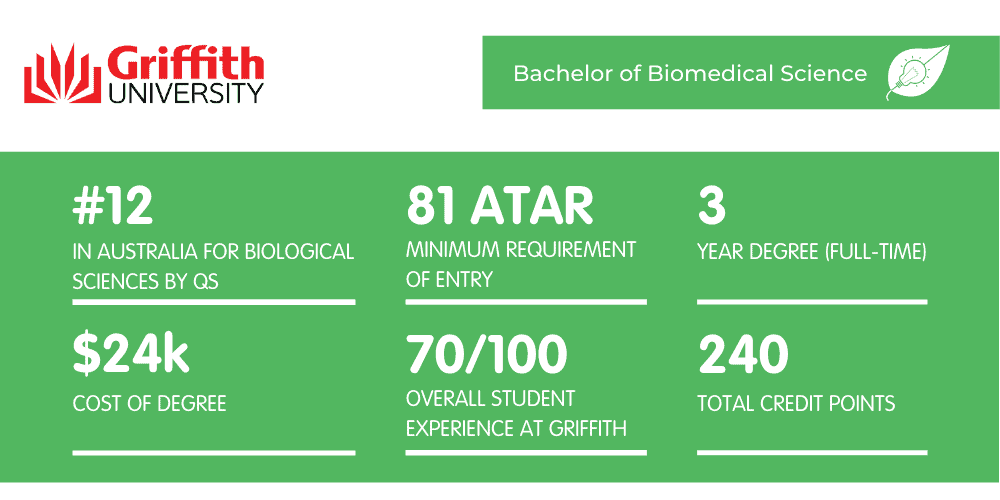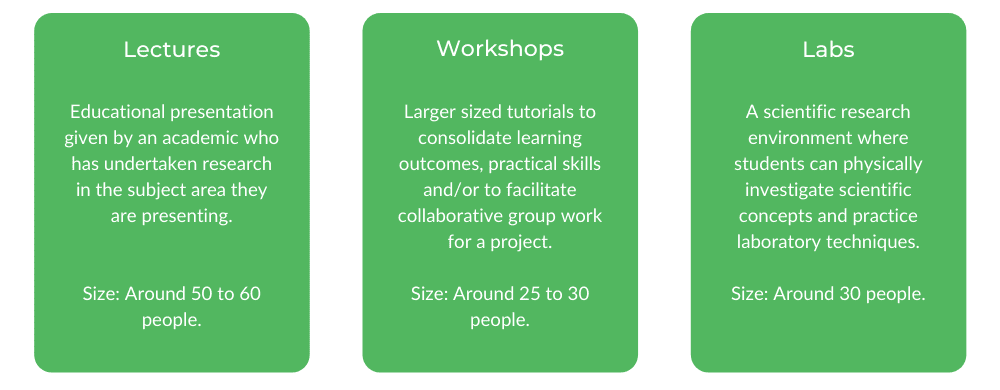Thinking about studying a Bachelor of Biomedical Science at Griffith?
Look no further as we give you the run-down on everything you need to know about the degree, including the subjects, assessments, culture, faculty and more.
Let’s dive into what you need to know!
What is a Bachelor of Biomedical Science at Griffith?
Core Units for this Degree
How to Get into a Bachelor of Biomedical Science at Griffith
What’s the Teaching Format?
What’s the Faculty and Culture Like?
What is a Bachelor of Biomedical Science at Griffith?
A Bachelor of Biomedical Science at Griffith is a 3-year degree that will provide you with knowledge and skills in biological and clinical science to apply to healthcare. You will gain an understanding of different methods for research, diagnosing and treating disease through hands-on, laboratory training.
During your degree, you will be introduced to a range of basic and advanced aspects of biomedical science, including neuroscience, biochemistry, immunology and pharmacology!
There are differing offerings of the Bachelor of Biomedical Science at Griffith at both their Gold Coast and Nathan campus, but this article will be focussing on their Gold Coast degree and course structure.
Who should study a Bachelor of Biomedical Science?
This degree is well suited for students interested in the human body, passionate about analysing data and who enjoy working hands-on. If you’re studying Chemistry, Biology, Physics or Mathematics, a Biomedical Science degree could be the one for you!
Honours and Masters
An opportunity for a one-year honours program is available for high-achieving students after successfully completing the course. This program is perfect for students who want to develop a more advanced understanding of health and research skills for diagnosing and treating disease.
To be eligible for entry into Bachelor of Biomedical Science (Honours), you must achieve a GPA (grade point average) of 5.0 or above in the 2nd and 3rd years of your degree, as well as secure a supervisor
You may also choose to apply for entry into the Doctor of Medicine or a range of other Masters degrees, including a Master of Pharmacy or a Master of Speech Pathology.
Career Paths
Following your degree, you’ll be prepared to work in a broad range of high demand fields, including healthcare, academia and pharmacology. Some of the possible career paths include:
- Laboratory medical scientist
- Biomedical Research
- Pathologist
- Healthcare technician
- Biomedical sales representative
- Microbiologist
Check out more of the career paths you can follow in the field of medical science here!
Core Units for this Degree
Students studying a Bachelor of Biomedical Science at Griffith must complete 16 core units throughout their degree. These subjects build on basic and advanced sciences, and are structured by year.
Here are the different units you’ll be taking throughout each year of study:
Year 1
- Chemistry of Biological Systems I – 1001MSC
- Health Challenges for the 21st Century – 1205MED
- Cells, Tissues and Regulation – 1014MSC
- Anatomy and Physiology Systems I – 1016MSC
- Genes and Disease – 1005MSC
- Chemistry of Biological Systems II – 1015MSC
- Anatomy and Physiology Systems II – 1017MSC
- Introduction to Biomedical Data Analysis – 1002MSC
Year 2
- Integrated Systems Physiology – 2012AHS
- Structural Biochemistry – 2008MSC
- Molecular Genetics – 2000MSC
- Microbiology – 2007MSC OR Fundamentals of Microbiology – 2003MSC
- Neurobiology – 2020MSC
- Metabolism – 2011MSC
- Pharmacology – 3002MSC
Year 3
- Molecular Medicine – 3022MSC
Health Challenges for the 21st Century introduces students to modern determinants to health and disease, while Neurobiology focusses on the structure and functioning of the brain. In Molecular Medicine, students focus on the development of diseases and investigate prevention methods.
Are there any majors or specialisations?
Unlike many other degrees, Biomedical Science at Griffith doesn’t have any majors because of how specialised the degree already is. Instead, you can choose from a wide range of electives to align with your career interests, including subjects like Nutrition, Epidemiology, Infectious Disease and Law and Synthetic Biology.
To gain valuable industry experience and refine your career ambitions, Work-Integrated Learning Placements provide students with an opportunity to undertake a project in a professional workplace and engage with experts in their field. The best part? The project earns credit towards your degree!
How to Get into a Bachelor of Biomedical Science at Griffith
The ATAR for guaranteed entry into a Bachelor of Biomedical Science at Griffith is 81 and above.
Assumed Knowledge and Prerequisite Subjects
You should have an assumed knowledge of Mathematical Methods (Units 3 & 4) as well as having studied either Biology, Chemistry or Physics.
The prerequisites for the degree are English, English as an Additional Language, Literature or English & Literature Extension (Units 3 & 4).
Pathway Programs
There are no VET pathways available for this course, yet you can gain admission into the second year of a Bachelor of Biomedical Science by completing a Diploma of Science at Griffith College. These courses run for 8 months and are equivalent to a university-level study.
Additionally, you can study a Bachelor of Biomedical Science at the Nathan Campus with an ATAR of 74.00 for guaranteed entry.
What scholarships are available?
Griffith has more than 600 scholarships on offer to support high-achieving domestic and international students from underprivileged areas, Indigenous backgrounds, with disabilities and much more.
The Sir Samuel Griffith Scholarship is one of Australia’s most generous scholarship programs for high achievers and is valued up to $24,000. The Griffith Futures Scholarship supports students experiencing financial or educational disadvantage with a maximum value of $5,000.
What’s the Teaching Format?
A Bachelor of Biomedical Science at Griffith is delivered through 12-week trimesters:
- Trimester 1 beginning in March (standard study period)
- Trimester 2 beginning in July (standard study period)
- Trimester 3 beginning in October (non-standard study period)
Class Structure
Classes for a Bachelor of Biomedical Science at Griffith are typically taught through lectures, workshops and labs.
Lectures
Lectures generally run for 1-2 hours and are held twice per week, with typically 50 to 60 people attending. The lecturer covers a range of foundational and advanced scientific content, and provides useful preparation for your workshops and labs!
Workshops
There are typically 2 hours of workshops held every fortnight, with usually about 25 to 30 people attending.
Before your workshop, you will usually be given question sheets to complete and have ready to discuss answers during class. Some workshops have graded quizzes at the end to make sure you’re paying attention.
Labs
Labs are usually once per week for 4 hours, or twice per week for 2 hours.
They typically have around 30 students and classes commonly involve you working on math equations to solve solutions related to the theory of your previous classes. Plus, you can also expect cadaver labs for anatomy classes!
How many hours do you have to go to university?
If you study a Bachelor of Biomedical Science at Griffith as a full-time student, you’ll usually take about 4 subjects per trimester. That means you’re looking at roughly 14-18 contact hours a week.
Though if you choose to take on a third trimester to complete some of your other subjects, you can spread your subjects out a little more.
Of course, you’re also expected to put extra hours into studying and revising your work!
What are the assessments like?
If you’re studying a Bachelor of Biomedical Science at Griffith, you can expect a lot of tests and quizzes to track your progress during your first two years. The final exams are generally 2 hours long and are close-booked, as well as containing a hurdle that requires a minimum of 40-45 to pass the whole subject.
For labs, assessments are often based on proving competency by repeating the experiments and calculation over and over until they are right. In your final year, you can expect to work on a fair share of lab reports as you work on your final project.
What skills do you develop?
A Bachelor of Biomedical Science at Griffith is a great degree to obtain both the theoretical foundations and hands-on, laboratory training needed for the workforce.
Combining classroom teachings with clinical and industry placements, this degree prepares you with the team work and interpersonal skills to successfully manage a work environment.
What’s the Faculty and Culture Like?
Faculty
Home to four Australian University Teachers of the Year, Griffith’s academic staff are professionals in their field and highly supportive of their students.
Biomedical Science is part of the School of Pharmacy and Medical Sciences, and the faculty holds an impressive standing with students. Teaching in high-class facilities, lecturers are known for being approachable and more than willing to stay back after class to answer any questions you may have.
The Medical Science Peer Mentoring Program is a great initiative that assists new students to Griffith by matching them with an older mentor. Whether you’re searching for academic guidance or social support, mentors are happy to help you find your footing in university and answer any questions you may have about student life.
If you’re looking for further academic support, students are able to request appointments with library learning advisers to receive help with reading assessments, breaking down questions, scaffolding assignments, grammar and referencing.
“I had one lecturer who helped me write my resume, which I wouldn’t have expected him to do at all, but it was really nice. The lecturers are always happy to help and are really good with responding to emails.” — Aabha Sahakari, Bachelor of Biomedical Science III at Griffith University
Culture
With more than 100 clubs and societies, Griffith is rich with opportunities to build connections based on social, professional, cultural, political, sporting and recreational interests.
If you’re interested in meeting people with a passion for biology, science and medicine, The Griffith University Biomedical Student Association and IntoMed are two student-run organisations that provide social and professional support for members!
Ashley Sullivan is a Content Writer for Art of Smart Education and is currently undertaking a double degree in Communications (Journalism) and a Bachelor of Laws at UTS. Ashley’s articles have been published in The Comma and Central News. She is a film, fashion and fiction enthusiast who enjoys learning about philosophy, psychology and unsolved mysteries in her spare time.






